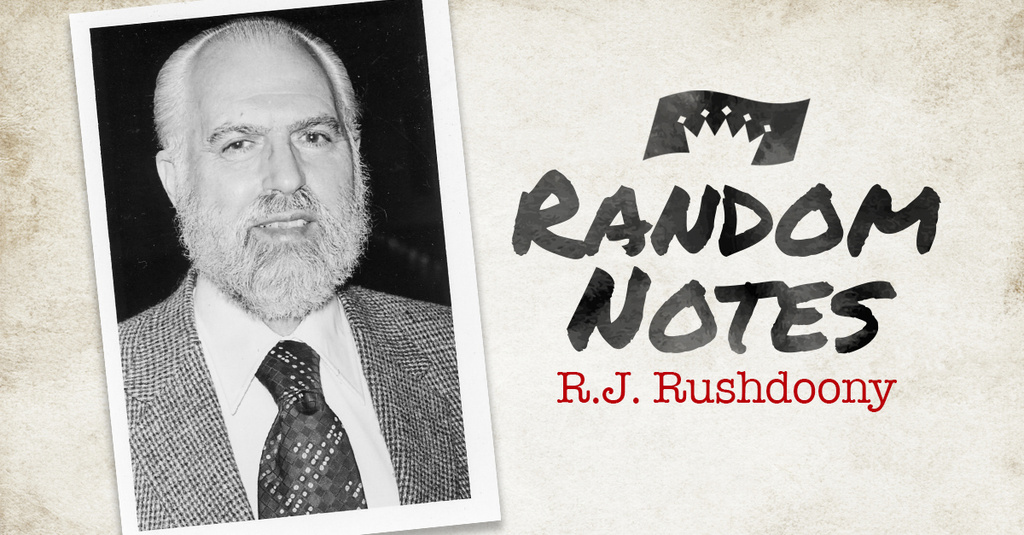
Random Notes, 83
Stanford University is now seen as a place for rich students. It was not always so but was actually created to be a university for poorer students.

- R. J. Rushdoony
- I realize how much times have changed when a well-read 17 year old young man called attention to a phrase in an essay he was reading. It spoke of "Jim Crow laws." "What were they?" he asked. History moves more rapidly than we often recognize.
- Stanford University is now seen as a place for rich students. It was not always so but was actually created to be a university for poorer students. The change to a high-tuition school for the elite was made by a poor student who became wealthy and important, Herbert Hoover. By a grim irony, Hoover, who founded there a great library, had to himself leave as the place became too leftist and hostile! When I was a boy, many people distrusted Hoover as a turncoat.
- The American Spectator, August, 1998, pp. 28ff., has a long article on "Whose Problem is 2000?" This article is about the computer collapse predicted for A.D. 2000. The author is semi-dismissive of Gary North's work here, but in reality his predictions are as grim and grimmer and give us a perspective that begins with the failure of the federal government to act sensibly.
- Localizing sin in a class, group, or people leads to Phariseeism. It becomes not a problem of Christ vs. fallen humanity, but us against the evil world. Moreover, too often false views of the world's problems have us study evil as an outside or alien problem, us against them. Our Lord warns against the study of "the depths of Satan," or "the deep things of Satan" (Rev. 2:24), so the study of conspiracies is off limits for Christians. The law-word of God, the Bible, not Satanic conspiracies, must be our study. We win by God's grace, not by the knowledge of evil. Too many who call themselves Christians can tell you more about conspiracies than about the word of God; this is evil.
We need to have a Biblical perspective on good and evil lest we too become evil ourselves.

- R. J. Rushdoony
Rev. R.J. Rushdoony (1916–2001), was a leading theologian, church/state expert, and author of numerous works on the application of Biblical law to society. He started the Chalcedon Foundation in 1965. His Institutes of Biblical Law (1973) began the contemporary theonomy movement which posits the validity of Biblical law as God’s standard of obedience for all. He therefore saw God’s law as the basis of the modern Christian response to the cultural decline, one he attributed to the church’s false view of God’s law being opposed to His grace. This broad Christian response he described as “Christian Reconstruction.” He is credited with igniting the modern Christian school and homeschooling movements in the mid to late 20th century. He also traveled extensively lecturing and serving as an expert witness in numerous court cases regarding religious liberty. Many ministry and educational efforts that continue today, took their philosophical and Biblical roots from his lectures and books.